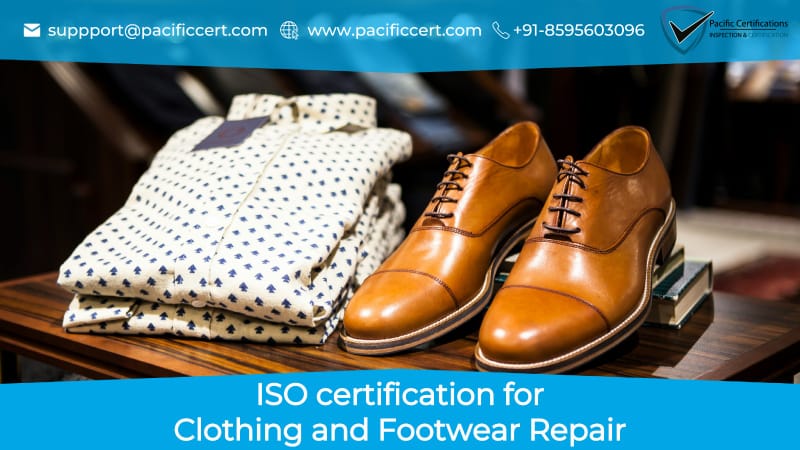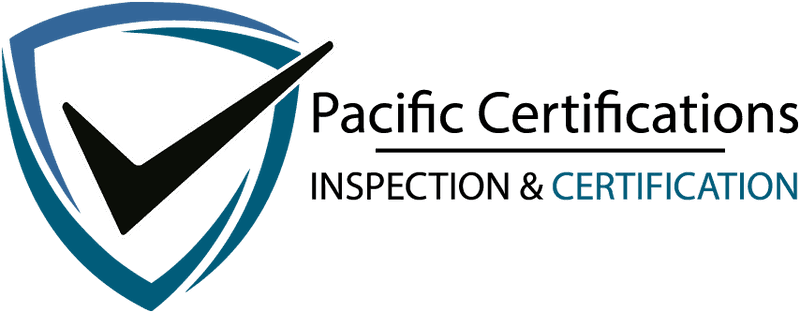ISO Certifications for Clothing and Footwear Repair, Requirements and Benefits

Introduction
Clothing and footwear repair operations involve alteration and tailoring services, hemming and resizing, zipper and button replacement, shoe resoling and heel repair, leather conditioning and restoration, stitch repair and patching, and custom fit adjustments across garments, footwear, and accessories. Service providers face operational challenges including chemical exposures from adhesives, dyes, solvents, and finishes used in shoe repair releasing harmful fumes, repetitive strain injuries from continuous sewing and stitching operations, equipment hazards from industrial sewing machines and pressing equipment, and quality consistency variations across diverse materials and repair types. These businesses provide alteration and tailoring services, shoe and boot repair, leather goods restoration, garment mending and patching, custom fitting adjustments, and zipper and fastener replacement for individual consumers, fashion retailers, dry cleaning operations, and specialty boutiques.
ISO certifications enable tailors and alteration shops, shoe repair specialists (cobblers), leather restoration services, and garment repair centers to establish internationally recognized frameworks addressing service quality, workplace safety from chemical and equipment hazards, environmental compliance for waste disposal, and customer satisfaction management. Repair businesses face mounting pressure from customers demanding quality workmanship and satisfaction guarantees, occupational safety authorities requiring ventilation controls for adhesive fumes and chemical exposures, environmental regulators mandating proper disposal of solvents and waste materials, and market sustainability trends favoring repair over replacement amid growing circular economy awareness.
Craftsmanship quality and customer satisfaction define excellence in clothing and footwear repair services.
Quick Summary
ISO certifications provide clothing and footwear repair services with internationally recognized frameworks to manage service quality through ISO 9001, occupational health and safety through ISO 45001, environmental impacts through ISO 14001, customer satisfaction through ISO 10002, risk management through ISO 31000, business continuity through ISO 22301, energy efficiency through ISO 50001, and information security through ISO/IEC 27001.
For more information on how we can assist your clothing and footwear repair business with ISO certifications, contact us at [email protected].
Applicable ISO Standards for Clothing and Footwear Repair Businesses
Below are the most relevant ISO standards applicable to tailors and alteration shops, shoe repair specialists, leather restoration services, and garment repair centers:
ISO 9001:2015 - Quality Management Systems
ISO 9001 is critical for clothing and footwear repair services establishing systematic quality controls for material assessment, repair technique selection, workmanship standards, fit verification, durability testing, and customer satisfaction measurement ensuring consistent repair outcomes across diverse garments and footwear. This standard enables repair businesses to standardize service delivery, document repair procedures, reduce rework and customer complaints, improve turnaround time consistency, and demonstrate commitment to quality craftsmanship enhancing reputation and customer loyalty.
ISO 14001:2015 - Environmental Management Systems
ISO 14001 addresses environmental impacts from clothing and footwear repair including solvent and adhesive chemical waste from shoe repair operations, fabric scraps and leather trim waste, dye and finishing chemical disposal, packaging materials, and energy consumption from pressing and sewing equipment. This standard ensures compliance with hazardous waste disposal regulations, solvent emission controls, and environmental permits while supporting circular economy principles by extending garment and footwear lifecycles through quality repairs reducing textile waste.
ISO 45001:2018 - Occupational Health and Safety Management Systems
ISO 45001 systematically manages workplace hazards unique to clothing and footwear repair including chemical exposures from shoe repair adhesives, leather dyes, solvents, and finishes generating harmful fumes requiring proper ventilation systems, repetitive strain injuries from continuous sewing and stitching motions, needle stick injuries, burns from pressing equipment and irons, and equipment hazards from industrial sewing machines. Implementation protects tailors, cobblers, and repair technicians through hazard identification, ventilation control systems meeting OSHA PEL requirements for VOC exposures, ergonomic workstation design, personal protective equipment requirements, and continuous safety monitoring reducing occupational health risks.
ISO 10002:2018 – Customer Complaint Management
ISO 10002 provides clothing and footwear repair businesses with frameworks for effective complaints handling addressing customer dissatisfaction regarding fit, workmanship quality, material matching, repair durability, or turnaround time delays. This standard enhances customer retention through systematic complaint resolution, improves service recovery procedures, identifies recurring quality issues through trend analysis, and demonstrates customer-centric operations critical for reputation management in service-oriented repair businesses.
ISO 31000:2018 - Risk Management
ISO 31000 provides clothing and footwear repair businesses with structured approaches to identify, assess, and mitigate operational risks including worker injuries from chemicals and equipment, material damage during repair, quality failures affecting reputation, supply disruptions for specialty materials, customer dissatisfaction and negative reviews, and business interruptions from equipment breakdowns or facility issues. This framework enables service providers to make informed decisions, prioritize safety investments, and ensure operational resilience in competitive service markets.
ISO 27001: Information Security Management Systems (ISMS)
ISO/IEC 27001 protects sensitive customer information in repair operations including personal contact details, payment card data, garment measurement specifications, customer preferences, and service history records stored in management systems. Implementation establishes security controls for customer data protection, payment processing security, cloud-based scheduling platforms, and privacy policies safeguarding customer information throughout the repair service lifecycle.
Click here to find out more applicable standards to your industry
What are the Requirements of ISO Certifications for Clothing and Footwear Repair Businesses?
Clothing and footwear repair providers seeking ISO certification must establish and maintain documented policies, procedures, and records aligned with the selected ISO standards. Key requirements include the following:
ISO 9001:2015 – Quality Management Systems
Develop quality policy and objectives for workmanship consistency, customer satisfaction targets, turnaround time commitments, and continuous service improvement
Define repair processes including garment inspection procedures, alteration specifications, repair technique selection, fitting protocols, quality verification, and customer approval workflows
Control supplier quality for thread, zippers, buttons, fabric patches, leather materials, shoe soles, adhesives, and specialty repair supplies ensuring material compatibility
Implement resource management ensuring availability of skilled tailors and cobblers, properly maintained sewing machines and repair equipment, pressing and finishing tools, and material inventories
Monitor quality metrics including customer satisfaction scores, complaint rates, rework percentages, turnaround time performance, and repeat customer rates
Conduct management reviews analyzing service performance data, customer feedback trends, technician training needs, material quality issues, and improvement opportunities
ISO 45001:2018 – Occupational Health and Safety Management Systems
Establish occupational health and safety policy addressing chemical exposure prevention, ergonomic injury reduction, equipment safety, and emergency response protocols
Identify workplace hazards through risk assessments of adhesive and solvent fume exposures in shoe repair, repetitive motion injuries from sewing operations, needle stick risks, pressing equipment burn hazards, and industrial sewing machine operation
Implement ventilation control systems including downdraft tables for shoe repair capturing adhesive fumes at source, local exhaust ventilation meeting OSHA permissible exposure limits for VOCs, air filtration systems removing particulate and vapor, and respiratory protection where ventilation is insufficient
Ensure worker safety through chemical safety training, ergonomic workstation design reducing repetitive strain, machine guarding on sewing equipment, personal protective equipment including gloves and respirators, and proper chemical storage
Monitor occupational health metrics including chemical exposure levels through air quality testing, musculoskeletal disorder rates, needle stick incidents, equipment-related injuries, and safety training compliance
Conduct regular safety audits of ventilation system effectiveness, chemical storage areas, personal protective equipment condition, sewing machine guards, and pressing equipment safety controls
ISO 10002:2018 – Customer Satisfaction and Complaints Handling
Establish complaints handling policy emphasizing accessibility, responsiveness, fairness, objectivity, confidentiality, and continuous improvement in customer issue resolution
Define complaints management process including multiple reporting channels, complaint acknowledgment procedures, investigation workflows involving technicians, resolution authority, and customer communication protocols
Implement tracking systems documenting complaint details, root cause analysis findings, corrective actions taken, resolution timeframes, customer satisfaction with outcomes, and trend identification
Monitor complaint patterns identifying recurring issues with specific repair types, material compatibility problems, technician performance concerns, or process breakdowns requiring systematic improvement
ISO 14001:2015 – Environmental Management Systems
Establish environmental policy addressing chemical waste disposal, fabric and leather scrap management, adhesive and solvent container disposal, and energy-efficient operations
Identify environmental aspects including VOC emissions from adhesives and solvents used in shoe repair, fabric waste from alterations, leather trim waste, chemical container disposal, thread and packaging waste, and energy consumption
Ensure compliance with hazardous waste disposal regulations, air quality standards for solvent emissions, chemical storage requirements, and waste management permits
Set environmental objectives for waste material recycling programs, transition to low-VOC adhesives and water-based products, fabric scrap donation to textile recyclers, and energy-efficient equipment adoption
Monitor environmental performance through chemical usage tracking, waste disposal documentation, emission monitoring where required, recycling metrics, and regulatory compliance audits
ISO 31000:2018 – Risk Management
Establish risk management framework integrating risk identification, assessment, treatment, monitoring, and communication throughout repair operations and customer interactions
Identify risks affecting worker safety from chemicals and equipment, garment damage during alterations, reputation damage from quality failures, material supply disruptions, and business interruptions
Assess risk likelihood and impact using failure mode analysis for common repair types, safety risk matrices for chemical and equipment hazards, and customer satisfaction risk evaluation
Implement risk treatments including worker safety training, quality control checkpoints, material testing procedures, backup supplier relationships, and business continuity procedures
Tip:Begin your ISO implementation by documenting existing repair procedures, safety protocols, chemical handling practices, and quality checks currently used in your operations. Engage experienced tailors, cobblers, alteration specialists, and safety coordinators in developing practical procedures that reflect actual repair techniques, material selection methods, fitting protocols, and ventilation practices rather than creating theoretical documentation disconnected from the craftsmanship skills and safety realities of daily clothing and footwear repair work.
For more information on how we can assist your clothing and footwear repair business with ISO certifications, contact us at [email protected].
Market Trends and Industry Outlook – Clothing and Footwear Repair
The global clothing and footwear repair market reached USD 3.8-9.7 billion in 2024-2026 and is projected to exceed USD 15 billion in the coming years with 5.3-7.1% CAGR, driven by rising consumer sustainability awareness favoring repair over replacement, increasing apparel costs making repairs economically attractive, circular economy initiatives reducing textile waste, and growing demand for personalized fashion and custom alterations. Regulatory trends include stricter occupational safety requirements for chemical exposure controls and ventilation systems, environmental compliance for solvent disposal, right-to-repair advocacy improving repair service access, and sustainability policies incentivizing textile lifecycle extension over landfill disposal.
ISO implementation in clothing and footwear repair operations delivers 20-30% improvements in customer satisfaction scores, measurable reductions in worker chemical exposure incidents through proper ventilation controls, enhanced workmanship consistency reducing rework, and stronger environmental compliance supporting circular economy positioning. ISO certification is becoming competitive differentiator for repair businesses pursuing retailer partnerships, corporate uniform service contracts, specialty boutique collaborations, and environmentally conscious consumers as quality expectations, worker safety standards, sustainability commitments, and professional service delivery drive market demands for certified quality and safety management systems in repair services.
How Pacific Certifications Can Help
Pacific Certifications, accredited by ABIS, acts as an independent certification body for clothing and footwear repair businesses by conducting impartial audits against applicable ISO standards. Our role is to objectively assess whether documented management systems and repair service operational practices conform to international ISO requirements, based strictly on verifiable evidence and operational records.
We support clothing and footwear repair providers through:
Independent certification audits conducted in accordance with ISO/IEC 17021
Practical assessment of real repair operations, workmanship quality controls, chemical safety practices, ventilation systems, environmental compliance, and customer satisfaction processes
Clear audit reporting reflecting conformity status and certification decisions
Internationally recognized ISO certification upon successful compliance
Surveillance and recertification audits to maintain certification validity
Objective evaluation of management systems across multiple repair locations, alteration shops, cobbler facilities, and service centers
If you need support with ISO certification for your clothing and footwear repair business, contact us at [email protected] or +91-8595603096.
Author: Alina Ansari
Read More at: Blogs by Pacific Certifications

